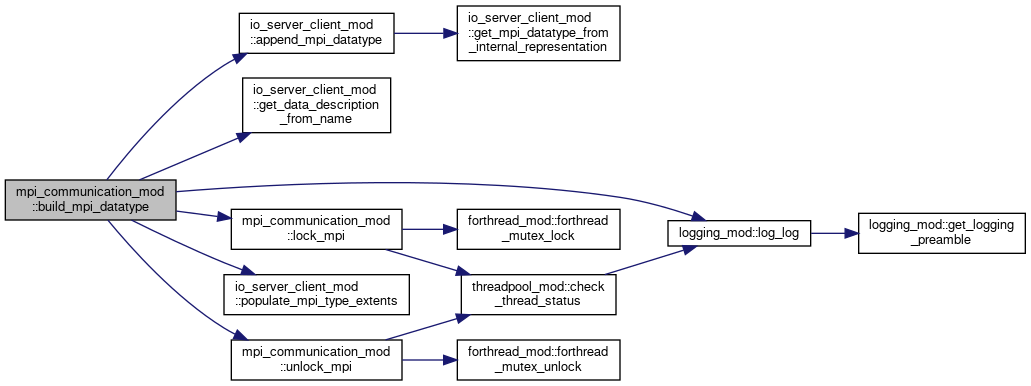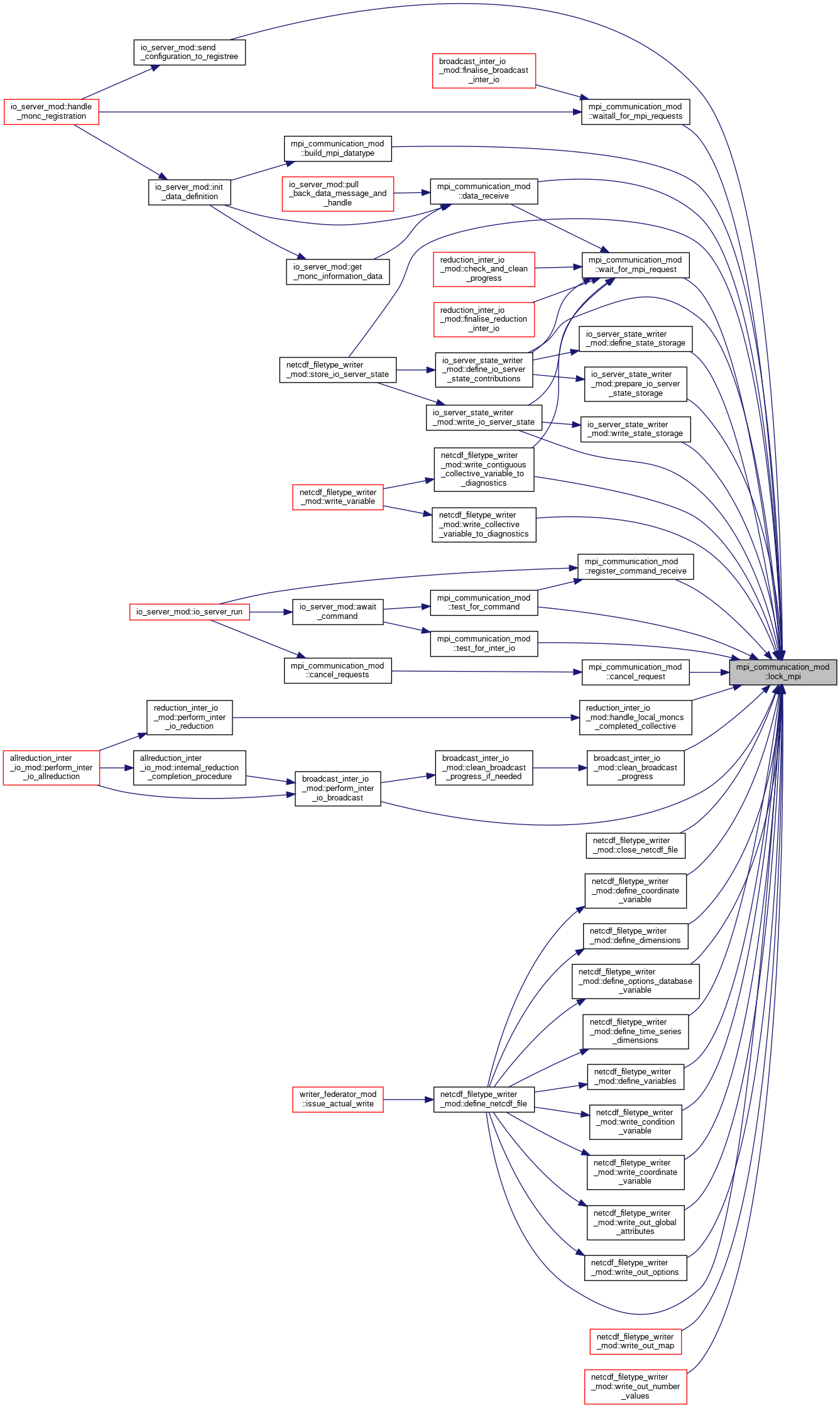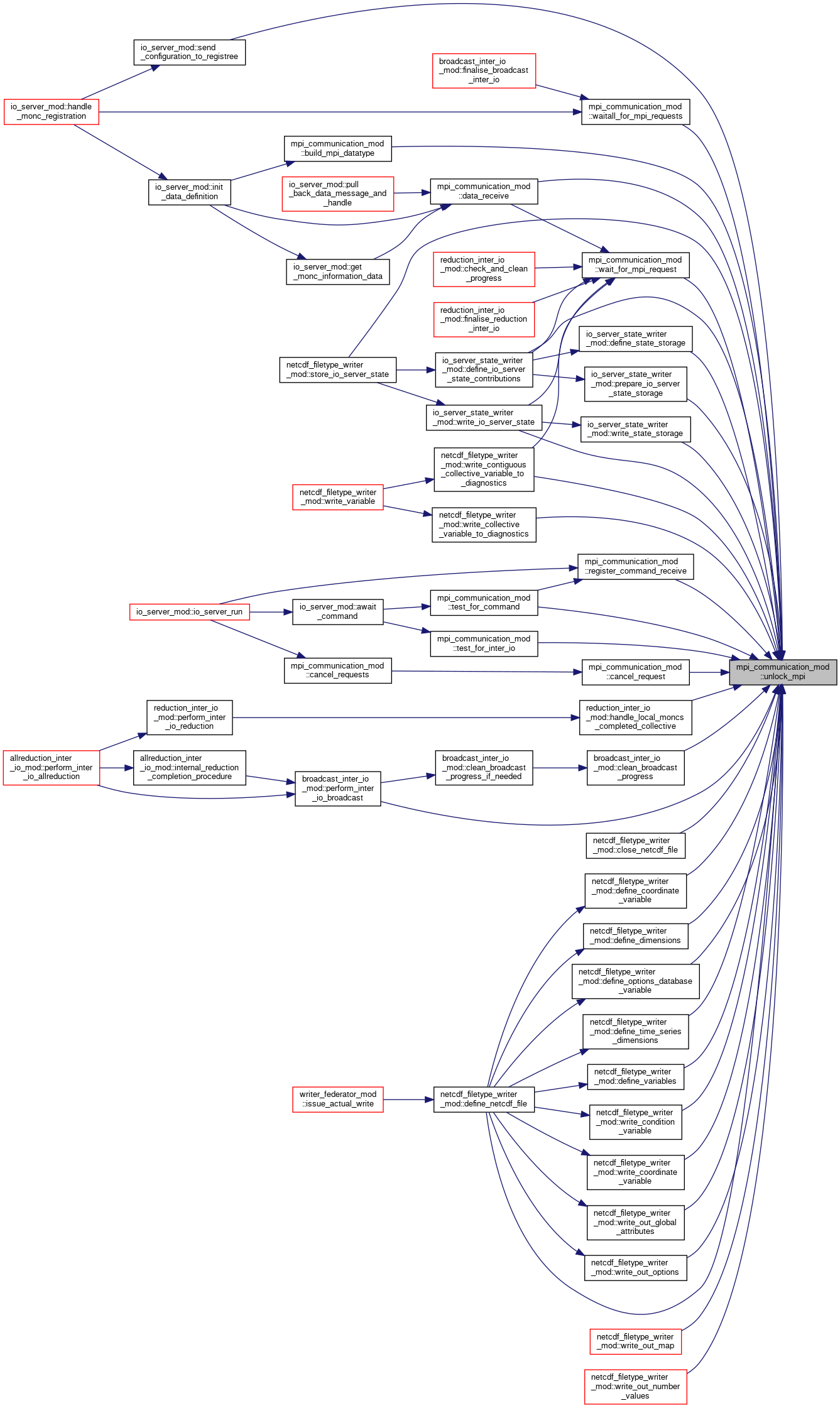Abstraction layer around MPI, this issues and marshals the lower level communication details. More...
Data Types | |
| interface | usleep |
Functions/Subroutines | |
| subroutine, public | initialise_mpi_communication (provided_threading) |
| Initialises MPI communication. More... | |
| subroutine, public | lock_mpi () |
| If we are explicitly managing MPI thread safety (SERIALIZED mode) then locks MPI. More... | |
| subroutine, public | unlock_mpi () |
| If we are explicitly managing MPI thread safety (SERIALIZED mode) then unlocks MPI. More... | |
| subroutine, public | pause_for_mpi_interleaving () |
| Pauses for a specific number of ms to allow for MPI interleaving, this is to avoid starvation. More... | |
| subroutine, public | wait_for_mpi_request (request, status) |
| Waits for a specific MPI request to complete, either by managing thread safety and interleaving or just a call to MPI if we are in multiple mode. More... | |
| subroutine, public | waitall_for_mpi_requests (requests, count) |
| Waits for all MPI requests to complete, either by managing thread safety and interleaving or just a call to MPI if we are in multiple mode. More... | |
| integer function, public | get_number_io_servers (io_comm) |
| Retrieves the number of IO servers that are running in total. More... | |
| integer function, public | get_my_io_rank (io_comm) |
| Retrieves my IO server rank out of the number of IO servers that are running. More... | |
| subroutine, public | register_command_receive () |
| Registers a request for receiving a command from any MONC process on the command channel. More... | |
| integer function, public | data_receive (mpi_datatype, num_elements, source, dump_data, data_dump_id, description_data) |
| Awaits some data on the data channel. This is of the type, size from the source provided and can either be written into a byte buffer or integer buffer depending upon the arguments provided. More... | |
| subroutine, public | cancel_requests () |
| Cancels all outstanding communication requests. More... | |
| subroutine | cancel_request (req) |
| Cancels a specific communication request. More... | |
| logical function, public | test_for_command (command, source) |
| Tests for a command message based upon the request already registered. More... | |
| logical function, public | test_for_inter_io (inter_io_communications, number_of_inter_io, io_communicator, command, source, data_buffer) |
| Tests for inter IO server communication. More... | |
| subroutine, public | free_mpi_type (the_type) |
| Frees an MPI type, used in clean up. More... | |
| integer function, public | build_mpi_datatype (data_definition, data_size_info, data_size, field_start_locations, field_end_locations, field_dimensions) |
| Builds the MPI type that corresponds to the data which will be received from a specific MONC process. Two factors determine the structure and size of this - the XML configuration which has been parsed and also specific details of array sizes sent by each process as part of its registration process. More... | |
Variables | |
| integer, parameter | ms_wait_between_tests =100 |
| Interface to the C usleep Linux call which allows us to sleep for a specific number of MS. More... | |
| integer | command_buffer |
| Buffer used to receive the command data into when it arrives on that channel. More... | |
| integer | command_request_handle |
| Request handle representing the asynchronous P2P command request. More... | |
| integer | mpi_threading_mode |
| integer, volatile | mpi_mutex |
| logical | manage_mpi_thread_safety |
Detailed Description
Abstraction layer around MPI, this issues and marshals the lower level communication details.
Function/Subroutine Documentation
◆ build_mpi_datatype()
| integer function, public mpi_communication_mod::build_mpi_datatype | ( | type(io_configuration_data_definition_type), intent(in) | data_definition, |
| type(data_sizing_description_type), dimension(:), intent(in) | data_size_info, | ||
| integer, intent(out) | data_size, | ||
| type(map_type), intent(out) | field_start_locations, | ||
| type(map_type), intent(out) | field_end_locations, | ||
| type(map_type), intent(out), optional | field_dimensions | ||
| ) |
Builds the MPI type that corresponds to the data which will be received from a specific MONC process. Two factors determine the structure and size of this - the XML configuration which has been parsed and also specific details of array sizes sent by each process as part of its registration process.
- Parameters
-
io_configuration IO server representation of the configuration which contains data structure layout array_sizes Sizes of each data array which has been received from a MONC process when it registeres data_size The data size corresponding to this type is returned (i.e. the buffer size in bytes required to hold it) field_start_locations For the MONC process the start location for each field, keyed on field name field_end_locations For the MONC process the end location for each field, keyed on field name field_dimensions Optional map of dimensions, if provided will store the number of dimensions for each field
- Returns
- The MPI data type representation
Definition at line 291 of file mpicommunication.F90.


◆ cancel_request()
|
private |
Cancels a specific communication request.
- Parameters
-
req Handle of the request to cancel
Definition at line 202 of file mpicommunication.F90.


◆ cancel_requests()
| subroutine, public mpi_communication_mod::cancel_requests |
Cancels all outstanding communication requests.
Definition at line 196 of file mpicommunication.F90.


◆ data_receive()
| integer function, public mpi_communication_mod::data_receive | ( | integer, intent(in) | mpi_datatype, |
| integer, intent(in) | num_elements, | ||
| integer, intent(in) | source, | ||
| character, dimension(:), intent(inout), optional, allocatable | dump_data, | ||
| integer, intent(in), optional | data_dump_id, | ||
| type(data_sizing_description_type), dimension(:), intent(inout), optional | description_data | ||
| ) |
Awaits some data on the data channel. This is of the type, size from the source provided and can either be written into a byte buffer or integer buffer depending upon the arguments provided.
- Parameters
-
mpi_datatype The MPI type of the data we are receiving size Number of elements to receive source The PID of the MONC process to receieve this data from dump_data (Optional) byte data buffer, for the data dump description_data (Optional) integer data buffer, for data description
Definition at line 165 of file mpicommunication.F90.


◆ free_mpi_type()
| subroutine, public mpi_communication_mod::free_mpi_type | ( | integer, intent(in) | the_type | ) |
Frees an MPI type, used in clean up.
- Parameters
-
the_type The MPI type to free up
Definition at line 273 of file mpicommunication.F90.

◆ get_my_io_rank()
| integer function, public mpi_communication_mod::get_my_io_rank | ( | integer, intent(in) | io_comm | ) |
Retrieves my IO server rank out of the number of IO servers that are running.
- Parameters
-
io_comm The IO server communicator
- Returns
- My IO server rank
Definition at line 139 of file mpicommunication.F90.

◆ get_number_io_servers()
| integer function, public mpi_communication_mod::get_number_io_servers | ( | integer, intent(in) | io_comm | ) |
Retrieves the number of IO servers that are running in total.
- Parameters
-
io_comm The IO server communicator
- Returns
- The number of running IO servers
Definition at line 127 of file mpicommunication.F90.

◆ initialise_mpi_communication()
| subroutine, public mpi_communication_mod::initialise_mpi_communication | ( | integer, intent(in) | provided_threading | ) |
Initialises MPI communication.
- Parameters
-
provided_threading The provided threading mode
Definition at line 45 of file mpicommunication.F90.


◆ lock_mpi()
| subroutine, public mpi_communication_mod::lock_mpi |
If we are explicitly managing MPI thread safety (SERIALIZED mode) then locks MPI.
Definition at line 57 of file mpicommunication.F90.


◆ pause_for_mpi_interleaving()
| subroutine, public mpi_communication_mod::pause_for_mpi_interleaving |
Pauses for a specific number of ms to allow for MPI interleaving, this is to avoid starvation.
Definition at line 67 of file mpicommunication.F90.

◆ register_command_receive()
| subroutine, public mpi_communication_mod::register_command_receive |
Registers a request for receiving a command from any MONC process on the command channel.
Definition at line 149 of file mpicommunication.F90.


◆ test_for_command()
| logical function, public mpi_communication_mod::test_for_command | ( | integer, intent(out) | command, |
| integer, intent(out) | source | ||
| ) |
Tests for a command message based upon the request already registered.
- Parameters
-
command The command which is received is returned to the caller source The PID of the source MONC process is returned to the caller
- Returns
- Whether a message is received or not
Definition at line 218 of file mpicommunication.F90.


◆ test_for_inter_io()
| logical function, public mpi_communication_mod::test_for_inter_io | ( | type(io_configuration_inter_communication_description), dimension(:), intent(inout) | inter_io_communications, |
| integer, intent(in) | number_of_inter_io, | ||
| integer, intent(in) | io_communicator, | ||
| integer, intent(out) | command, | ||
| integer, intent(out) | source, | ||
| character, dimension(:), intent(inout), allocatable | data_buffer | ||
| ) |
Tests for inter IO server communication.
- Parameters
-
inter_io_communications Data structures representing the possible inter IO communication sources number_of_inter_io Number of inter IO communication descriptions registered command The command which is received is returned to the caller source The source of the inter IO communication, which is set to the index of the inter descriptor
- Returns
- Whether a message is received or not
Definition at line 243 of file mpicommunication.F90.


◆ unlock_mpi()
| subroutine, public mpi_communication_mod::unlock_mpi |
If we are explicitly managing MPI thread safety (SERIALIZED mode) then unlocks MPI.
Definition at line 62 of file mpicommunication.F90.


◆ wait_for_mpi_request()
| subroutine, public mpi_communication_mod::wait_for_mpi_request | ( | integer, intent(inout) | request, |
| integer, dimension(mpi_status_size), intent(inout), optional | status | ||
| ) |
Waits for a specific MPI request to complete, either by managing thread safety and interleaving or just a call to MPI if we are in multiple mode.
- Parameters
-
request The MPI request handle
Definition at line 74 of file mpicommunication.F90.


◆ waitall_for_mpi_requests()
| subroutine, public mpi_communication_mod::waitall_for_mpi_requests | ( | integer, dimension(:), intent(inout) | requests, |
| integer, intent(in) | count | ||
| ) |
Waits for all MPI requests to complete, either by managing thread safety and interleaving or just a call to MPI if we are in multiple mode.
- Parameters
-
requests The MPI request handles to wait for count The number of request handles to wait for
Definition at line 105 of file mpicommunication.F90.


Variable Documentation
◆ command_buffer
| integer mpi_communication_mod::command_buffer |
Buffer used to receive the command data into when it arrives on that channel.
Definition at line 32 of file mpicommunication.F90.
◆ command_request_handle
|
private |
Request handle representing the asynchronous P2P command request.
Definition at line 32 of file mpicommunication.F90.
◆ manage_mpi_thread_safety
|
private |
Definition at line 36 of file mpicommunication.F90.
◆ mpi_mutex
|
private |
Definition at line 35 of file mpicommunication.F90.
◆ mpi_threading_mode
|
private |
Definition at line 32 of file mpicommunication.F90.
◆ ms_wait_between_tests
|
private |
Interface to the C usleep Linux call which allows us to sleep for a specific number of MS.
Definition at line 21 of file mpicommunication.F90.